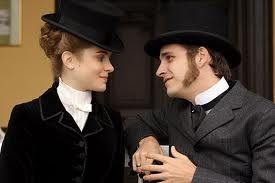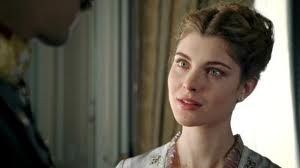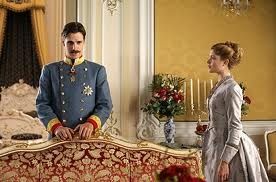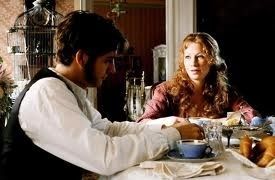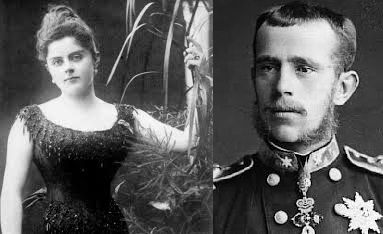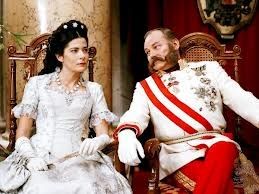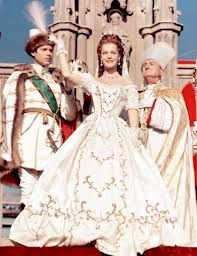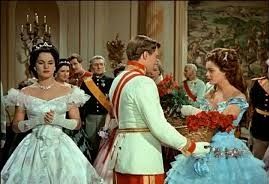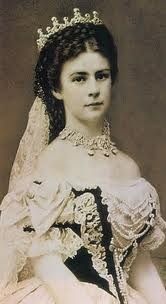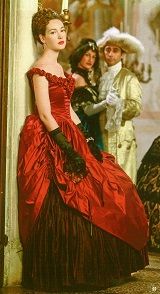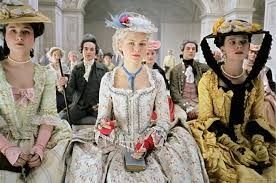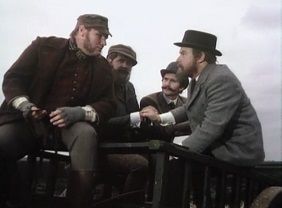 |
| A peasant gives (from left) King George of the Hellenes, Bertie, the Prince of Wales, and Czar Alexander a lift in his cart. |
Czar Alexander: Yes we are. I am Alexander, Czar of Russia. This gentleman is the Prince of Wales
Peasant: I see. And, uh, you, Sir? Who might you be?
King George: I might be and I am King George of the Hellenes.
Peasant: Ah, yes. You know who I am, Gentlemen?
Edward VII: No, who are you?
Peasant: Napoleon Bonaparte.
I really only started watching this miniseries because of my interest in Queen Victoria (she is actually the reigning monarch for the first 10 episodes), not having much interest in Edward VII himself, but I got caught up in the whole story. The series includes 13 segments, each an hour long, so it's a trek, but it's quite compelling once you get past the shoddy camera quality. The actors and the excellent script make it worth the time.
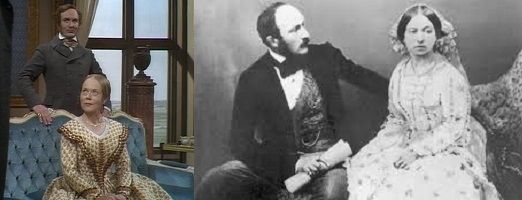 |
| Albert and Victoria and a photograph of the real Prince Albert and Queen Victoria. |
The series starts with Queen Victoria pregnant with Edward VII, called Bertie (short for Albert), and not at all happy about it. Poor Bertie, named for his father, Prince Albert, never stood a chance. He could never live up to his father in his mother's eyes, and Prince Albert held such high scholastic and moral standards for him that he was doomed to fall short of his father's expectations. Prince Albert decided that they "must apply to the most eminent men in the county, and get them to draw up a system of education. The boy must be kept apart from other children, except for the family. His character must be molded and his mind developed. Morally and intellectually." A noble idea, in theory, but the isolation and strict educational regime led to a miserable, restricted, lonely childhood. Bertie struggled in this environment, to the chagrin of his parents, who favored his older sister, Vicky. They become so prejudiced about his abilities, that when he does do well, they refuse to give him any credit, as when he receives rave reviews during his tour of of the United States:
Victoria: What was that the President said?
Albert: That Bertie’s tour has been a triumph. Look at this. He has been everywhere and received with enthusiasm, attributable to his own noble and manly bearing, dignified, frank and affable. In our domestic circle, he won all hearts.
Victoria: It doesn’t sound like Bertie.
Albert: Not the one I know.
Victoria: Well, what had happened? How can he have won such opinions?
Albert: They have been carried away. An actual demonstration of affection with which they greeted your representative has made them believe it was due to Bertie himself.
Victoria: Of course.
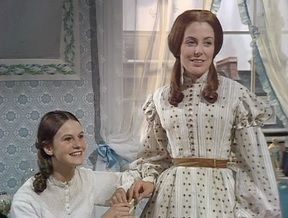 |
| Young Minnie and young Alexandra of Denmark. |
This negative opinion of Bertie is solidified with the death of Prince Albert. Queen Victoria considers all of her husband's opinions sacrosanct. This not only means that Prince Albert's views of Bertie as a disappointing son will remain fixed in Victoria's mind, but also results in the marriage of Bertie to Alexandra of Denmark being settled on. As Vicky's husband, Fritz, observes, Albert "wished Bertie to marry Alexandra. But your mother –every thought of his has become law, every wish a command. So whatever his feelings, Bertie had better prepare himself for it."
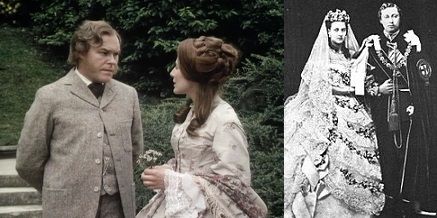 |
| Bertie proposing to Alex and a photo from the wedding of the real Alexandra and Edward VII. |
The marriage turns out to be a good thing for Bertie. The stylish and beautiful Alexandra is hugely popular with the English people. With her by his side, Bertie is able to take on a new role in society:
Prime Minister Palmerston (PM): I’m glad, Sir, your bride has been so enthusiastically received.
Bertie: People adore her.
PM: Yes, with reason.
Bertie: We have so many invitations that if we accepted them all, we’d have no time to ourselves.
PM: Well, it would be a sacrifice, but one I should welcome.
Bertie: How?
PM: There is a growing protest against Her Majesty’s self-imposed seclusion. Part of the function of the monarchy is to be seen. People feel slighted, as if the Queen considers that their needs are unimportant compared to her private sorrows. But you can help.
Bertie: I can?
PM: Well, you and Her Royal Highness. Well, you cannot deputize with the Queen without her consent, but you can be seen as often as possible. You’re the natural leads of society. You can bring joy and vitality back to public life after these years of mourning.
Following Prime Minister Palmerston's advice, Bertie becomes a leading man in society and an important figurehead, but Queen Victoria fails to appreciate his efforts:
PM: His Royal Highness is asking for acknowledgment of his worth and position, and recognition of the valuable work he has done it –
Victoria: Work? Valuable? What is valuable in this world of amusements?
PM: Ma’am, in the past six months, His Royal Highness has attended banquets at the Royal Academy, the Guildhall, the universities, amongst others. He has presided at charities, laid the foundation stones for public buildings and hospitals, received the freedom of cities –
Victoria: And plunged headlong into society, which his father always kept at a distance, with good reason. You go about, begging for admiration, with no care for your position. And Alexandra is the same, I am very disappointed in her.
Bertie: We have a duty –
Victoria: You have a duty to deny yourself amusement, in order to keep up that moral tone in society, which used to be the pride of England. The greatest danger to the country lies in the conduct of the higher classes.
Bertie: They’ll take their tone from me.
Victoria: And what are you? Nothing but a puppet running about every night for show.
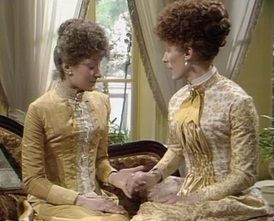 |
| Minnie and Alex. |
In spite of his parents, and their relentlessly derogatory attitude towards him, Bertie actually developed many good qualities as a leader, though he would only end up reigning for 9 years. He continued to meet with the prime ministers throughout his mother's reign behind her back, and excelled at foreign affairs. We are left to wonder what he might have accomplished had Queen Victoria not actively denied him the opportunity to be useful at every turn throughout her life:
Victoria: Yes, I know he was received favorably in Egypt and Turkey. That was because he is my son.
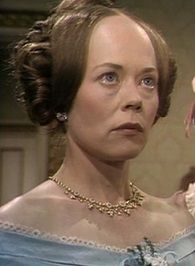 |
| Annette Crosbie as Queen Victoria. |
Victoria: He would have said the same about any of my sons.
PM: But we are talking about the Prince of Wales, Ma’am.
Victoria: What does that mean, Lord Palmerston?
PM: About him taking on his share of the royal duties. Those duties which he should fulfill, and which are expected of him as heir apparent.
Victoria: There are no duties laid down for the heir.
PM: But you said yourself, Ma’am –
Victoria: I may have done, but I have reconsidered. I do not yet –We do not believe that Our son is yet capable of taking part in government. I intend to carry out all my duties, as my husband would have expected, by myself.
It gets to the point that Bertie begins to believe that he will never be crowned King, and almost refuses an emergency appendectomy in the belief that he will die during the operation and never become King:
Bertie: How the hell can you even suggest it? Do you know what I’ve been going through? Leave the room!
Dr. Laking: Sir, I cannot! I would fail in my duty if I failed you.
Bertie: I tell you, Laking, I will be crowned! I shall go to my coronation if I die in the Abbey.
Bertie: That is exactly what will happen!
As Queen Alexandra waits for the operation to be over (it ends up being completely successful), she frets, saying, "He always knew it would happen. Secretly, he’s always been afraid that he would die before he was crowned."
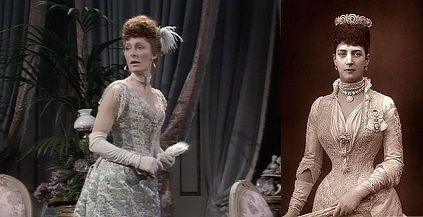 |
| Alex and a photo of the real Queen Alexandra. |
Constantly frustrated, and perhaps as a result of his overly restrictive childhood (or maybe just because it's his personality), Bertie seeks out many mistresses throughout his life. Queen Alexandra, always the perfect royal wife, tolerates Bertie's many adulteries, though she reveals the hurt they cause her to her friend, Oliver Montague (with whom she seems to have shared a platonic love):
Alexandra: It’s beginning again, isn’t it? Only this time it’s Lady Brooke.
Oliver: I’m quite sure that His Royal Highness –
Alexandra: No, Oliver, don’t say anything. I couldn’t bear it if I felt you were lying to me.
Oliver: Never, Ma’am.
Alexandra: Oh, my dear, I’m sorry. I’m in a silly mood this evening. Please forgive me.
Oliver: You have nothing to fear, Ma’am. I think you know that.
Alexandra: Have I not? I sometimes wonder. No, you’re right. Of course you’re right. I’ve nothing to fear. He loves me best. I believe that. It’s just that –Do you think she’s pretty?
Oliver: Lady Brooke? Tolerably pretty, I’d say.
Alexandra: She is, isn’t she? They’ve always been pretty. Mrs. Langtry, that dreadful chamber pots woman. Am I pretty too, I wonder? Am I pretty, Oliver? I want the truth, mind. Am I as pretty as Lady Brooke?
Oliver: You’re beautiful, Ma’am. It’s far above prettiness.
Alexandra: Oliver, do you think so? Do you really think so?
Oliver: I do.
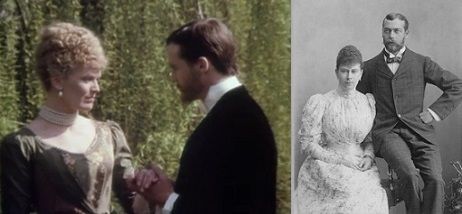 |
| Prince George (later George V) proposing to Mary of Teck (later Queen Mary) and a photograph of the real Queen Mary and King George V. |
What's really great about this series is that it isn't just about Edward VII, but about a whole cast of important figures during his lifetime. We get to know various prime ministers (Disraeli, Gladstone, etc.), Victoria and Albert's other children (especially Vicky and Alice), and Bertie's wife, Queen Alexandra from Denmark, and her sister, Dagmar, who becomes Empress Maria Feodorovna of Russia and mother of the last Czar, Nicholas II. We also are introduced to the children of all these characters, including the future George V of England, the aforementioned Czar Nicholas II, and Vicky's son Wilhelm II, Kaiser of Prussia. I learned a lot about European history, and about the important figureheads of that era.
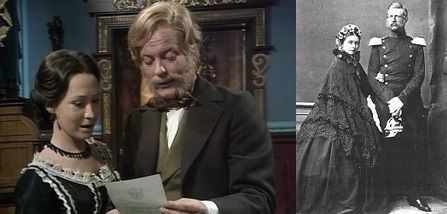 |
| Vicky and Fritz and a photograph of the real Princess Victoria and Frederick III. |
Vicky married Fritz, who was to become Emperor of Germany and King of Prussia as Frederick III. They were quite liberal in their policies, and had big ideas for the future of Germany, which were sadly not meant to be. Fritz died after only 99 days on the throne, leaving their volatile son Wilhelm II to rule:
Bertie: Try to bear up, my dear. If it’s any comfort, I’m certain that short as his reign was, his name will not be forgotten.
Vicky: He had such plans, such dreams we both had. Now all that will be lost.
Bertie: No, no, Willie will carry on the work.
Vicky: You know that isn’t true. Willie is not on our side. He’s completely under the influence of that monster, Bismark. He said I am to blame for Fritz’s death.
Alexandra: Oh no.
Vicky: That if I hadn’t insisted on an English doctor, his life could have been saved.
Bertie: Oh, that’s ridiculous.
Vicky: I know. Oh, Bertie, what am I to do? He’s behaving so strangely. Friedrichshof has been surrounded by soldiers. I’m virtually a prisoner in my own house.
Bertie: Try to keep calm, Vicky.
Vicky:And he speaks so cruelly of his father. Oh, I cannot –oh God help me…I am frightened of him. Yes it’s true. I’m frightened of my own son.
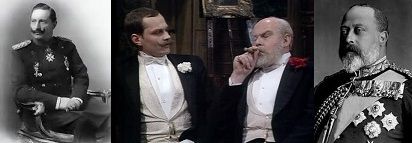 |
| Photo of the real Kaiser Wilhelm II of Prussia, Wilhelm (Willy) with Bertie, and a real photo of Edward VII. |
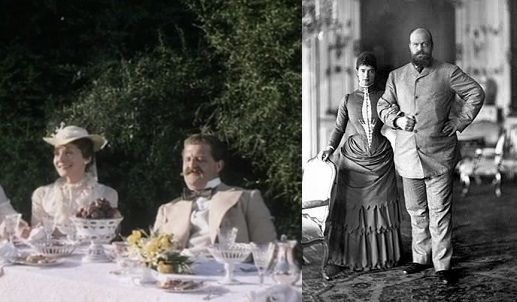 |
| Minnie and Sasha and a photo of the real Empress Maria Feodorovna and Alexander III of Russia. |
Alexandra's sister Dogmar, renamed Maria Feodorovna but called Minnie by her friends, married Sasha, who became Czar Alexander III of Russia after his father's assassination. Interestingly, if Alexandra hadn't married Bertie, she was the one who would have married Sasha and become Empress of Russia, potentially changing the course of Russian history in a big way. Minnie's son, Nicholas II, became the ill-fated Czar after his father's death. Visiting with Bertie, the two discussed their very different roles as leaders:
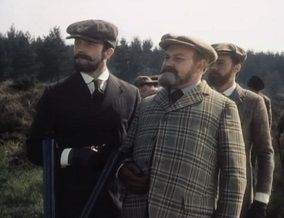 |
| Czar Nicholas (Nicky) and Bertie. |
Nicholas: My father?
Bertie: Yes. Yes, envied his power. In Russia, you’re the absolute rulers of your country. I remember telling him I wished we still had that sort of authority here.
Nicholas: Oh, but the Queen is the ruler of her people.
Bertie: In name, yes, but in fact no, not anymore. And I used to regret that, you see?
Nicholas: You do not regret it now?
Bertie: No, no. I think now that if we are to survive, it can only be as constitutional monarchs.
Nicholas: You are content to be a figurehead? I could never be happy with such a position. We have a duty to lead our people. They are like children, and children need a father.
Bertie: A father who orders, or a father who suggests?
Nicholas: A child does not respect that sort of father.
Bertie: Nor love the other sort.
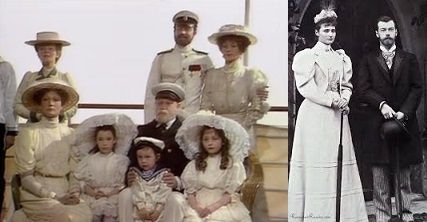 |
| The Romanovs with Minnie (standing next to Nicholas), Bertie and Toria (Bertie and Alex's daughter, behind Alexandra) and a real photograph of Empress Alexandra and Tsar Nicholas II |
These words are particularly interesting given that it appears to have been the diminished role of the monarchy that actually saved it during World War I. George V, who succeeded his father, was one of the only major monarchs in Europe to keep his throne. Nicholas, of course, was executed, along with his wife and children. Wilhelm and the Austrian Emperor Charles I were sent into exile.
This series has definitely inspired me to watch Fall of Eagles, which focuses on many of the same characters and some of the characters from The Crown Prince and Sissi.
